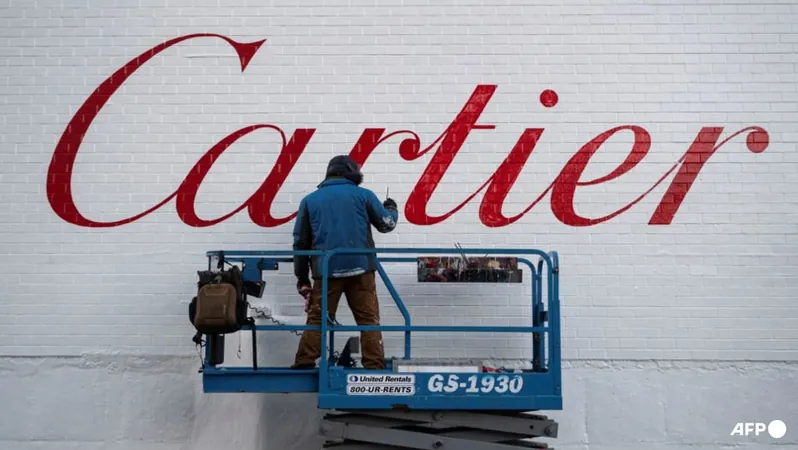
Richemont's Sales Stumble Amid Chinese Demand Decline – What’s Next for Cartier?
2024-11-11
Author: Rajesh
Overview of Richemont's Performance
In a troubling quarter for the luxury industry, Swiss luxury conglomerate Richemont, the parent company of Cartier, reported a 1% decline in sales, bringing revenue down to €4.8 billion ($5.14 billion) for the three months ending September 30. This underperformance comes as a stark contrast to analysts' expectations of a 2% increase, reflecting broader challenges in the luxury goods market, primarily due to stalling demand from China.
Regional Sales Disparities
Richemont's performance highlights significant regional disparities. In the Asia Pacific, sales plummeted by 18% compared to the same period last year, much worse than analysts had anticipated. However, the Americas, Japan, the Middle East, and Europe showed robust growth, somewhat cushioning the impact of the downturn in Asia.
Jewelry and Watch Performance
The luxury group's jewelry division, which includes esteemed brands like Cartier and Van Cleef & Arpels, managed to display some resilience with a 4% rise in sales, achieving €3.44 billion. Yet, this was still short of the expected 5% growth. Contrarily, the watch segment faced severe pressures, witnessing a staggering 19% decline.
Concerns from Leadership
Richemont Chairman Johann Rupert voiced concerns about Chinese consumer demand, suggesting that recovery might be a gradual process due to persistently low consumer confidence in the region. Chief Executive Nicolas Bos echoed this sentiment, indicating that the downturn appears to be a long-term challenge rather than a temporary setback.
Market Reaction
The market reacted negatively to the news, causing Richemont shares to drop nearly 4% in early trading on November 8, currently valuing the company at approximately SFr68 billion. Although the company's shares have appreciated by 6% throughout the year, the uncertainties surrounding the Chinese luxury market raise questions about future growth.
Industry-Wide Struggles
Richemont is not alone in its struggles. Other luxury giants, like LVMH, have also reported disappointing sales figures amid the ongoing slump in demand from China. Kering, known for its Gucci brand, indicated that its operating income could decline by almost half this year, highlighting the widespread impact of decreasing consumer spending in the world’s second-largest economy. However, luxury brand Hermès continues to thrive, indicating that some segments within the luxury sector are still resilient.
Financial Setbacks
Additionally, Richemont's operating profits for the first half of the year dropped by 17% year-over-year, failing to meet expectations. The company also recorded a €1.2 billion non-cash writedown associated with selling its online retail business, Yoox Net-a-Porter, to German e-commerce firm Mytheresa, which further illustrates the volatility in the market.
Leadership Changes
As Richemont navigates these challenges, it has been undergoing significant leadership changes. Recent months saw Johann Rupert bolster the company's management structure with Nicolas Bos stepping in as the new CEO, and the appointment of fresh leadership at Cartier and Van Cleef & Arpels, with Louis Ferla taking over as Cartier's CEO.
Future Outlook
Analysts remain cautiously optimistic, considering the strong performance of Richemont’s jewelry brands a silver lining in an otherwise turbulent period. However, they acknowledge that the macroeconomic landscape continues to pose significant challenges.
Conclusion
As Richemont adapts to these shifting market conditions while focusing on its core jewelry brands, investors are left questioning – how long will it take for the luxury sector in China to fully bounce back? Only time will tell if Cartier and its luxury counterparts can regain their former glory in a post-pandemic world.



 Brasil (PT)
Brasil (PT)
 Canada (EN)
Canada (EN)
 Chile (ES)
Chile (ES)
 España (ES)
España (ES)
 France (FR)
France (FR)
 Hong Kong (EN)
Hong Kong (EN)
 Italia (IT)
Italia (IT)
 日本 (JA)
日本 (JA)
 Magyarország (HU)
Magyarország (HU)
 Norge (NO)
Norge (NO)
 Polska (PL)
Polska (PL)
 Schweiz (DE)
Schweiz (DE)
 Singapore (EN)
Singapore (EN)
 Sverige (SV)
Sverige (SV)
 Suomi (FI)
Suomi (FI)
 Türkiye (TR)
Türkiye (TR)